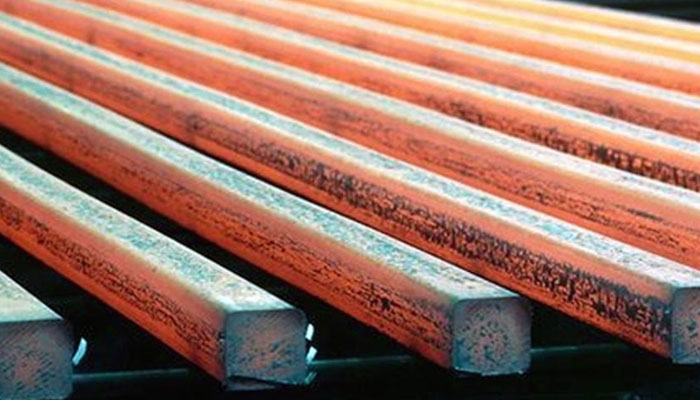Steelmakers, auto industry demand taxes’ rationalisation
KARACHI: Steel makers and auto parts’ makers on Tuesday demanded the government to rationalise taxes to support trade and industry amid the rising prices in the international market.
Domestic steel firms attribute the northward movement of the steel price to the rising iron ore prices, which have gone up multiple times in the recent past.
“High steel rates are a global phenomenon due to higher demand than supplies and we are in fact net importers of steel and its raw materials,” said Faizan Idrees, chief executive officer of ARE Steels.
“The government gave some duty and tariff concessions for the steel sector to minimise the impact of high steel rates and if it could for the time being waive sales tax on steel products, it could further boost construction activities and employment opportunities.”
Pakistan is among the few economies that recovered immediately after the Covid lockdown. Steel prices have skyrocketed along with the rates of other metals and commodities. Currently, the steel rates in Pakistan are hovering around Rs136,000 to Rs142,000/ton.
Two major industries where steel is consumed are construction and automobile industries.
Industries that showed tremendous growth post Covid-19 in Pakistan are construction and automobiles both using steel.
An official said local auto manufacturers are facing a dilemma how to stabilise the rates of their variants because with each increase in steel and other metals price the cost goes up.
The industry has recently suffered losses during some zero production months in Covid-19 peak. It is not in a position to absorb the high rates of these inputs.
“Local industry is always brutally criticised on each price hike without examining the ground realities and the much higher increase in the prices of imported variants at the same time that are allowed as completely built-up units at low duties,” the official said.
The government should lower the taxes on inputs for the auto industry, especially steel, to ensure stable prices. “It could raise the taxes whenever steel prices come down again to ensure a steady revenue collection,” he added.
There is a systematic increase in the prices of cars in neighbouring India that produces a lot of steel from indigenous sources.
Indian car makers including Maruti Suzuki, Ford India, Nissan, Kia India, Hyundai India, Renault India, Honda Cars India and many other announced price increases between the range of 3 to 5 percent from January 2021.
The prices have increased because of higher demand as some manufacturers are operating at 60-70 percent capacities despite having orders but they cannot gear up production due to short supply of steel.
Aluminum and copper are being exported in the form of scrap and ingots, and that is causing severe shortage for other industries which use these metals as raw materials.
Pakistan Electric Fan Manufacturers’ Association asked the government to withdraw regulatory duty on aluminum import and ban its export as increase in input cost is affecting future production plans and further revenue generation for the exporting industries.
The world has witnessed substantial increase in the prices of numerous metals that is accompanied with their short supply or higher demand. The largest consumer of metals these days is China where the demand for steel has almost doubled from pre-covid-19 levels while the demand for aluminum and copper has substantially increased. This is all because of high economic activities in China.
According to reports, the import of steel and iron in various forms increased and the trend continues to rise.
Copper ores and concentrates also increased in China from over $2 billion to $3.3 billion between June and November.
-
 King Charles Holds Emergency Meeting After Andrew Arrest: 'Abdication Is Not Happening'
King Charles Holds Emergency Meeting After Andrew Arrest: 'Abdication Is Not Happening' -
 Amazon Can Be Sued Over Sodium Nitrite Suicide Cases, US Court Rules
Amazon Can Be Sued Over Sodium Nitrite Suicide Cases, US Court Rules -
 'Vikings' Star Mourns Eric Dane's Death
'Vikings' Star Mourns Eric Dane's Death -
 Patrick Dempsey Reveals Eric Dane's Condition In Final Days Before Death
Patrick Dempsey Reveals Eric Dane's Condition In Final Days Before Death -
 'Heartbroken' Nina Dobrev Mourns Death Of Eric Dane: 'He'll Be Deeply Missed'
'Heartbroken' Nina Dobrev Mourns Death Of Eric Dane: 'He'll Be Deeply Missed' -
 Andrew Mountbatten-Windsor’s Arrest: What Happened When A Royal Was Last Tried?
Andrew Mountbatten-Windsor’s Arrest: What Happened When A Royal Was Last Tried? -
 Alyssa Milano Expresses Grief Over Death Of 'Charmed' Co-star Eric Dane
Alyssa Milano Expresses Grief Over Death Of 'Charmed' Co-star Eric Dane -
 Prince William, Kate Middleton Camp Reacts To Meghan's Friend Remarks On Harry 'secret Olive Branch'
Prince William, Kate Middleton Camp Reacts To Meghan's Friend Remarks On Harry 'secret Olive Branch' -
 Daniel Radcliffe Opens Up About 'The Wizard Of Oz' Offer
Daniel Radcliffe Opens Up About 'The Wizard Of Oz' Offer -
 Channing Tatum Reacts To UK's Action Against Andrew Mountbatten-Windsor
Channing Tatum Reacts To UK's Action Against Andrew Mountbatten-Windsor -
 Brooke Candy Announces Divorce From Kyle England After Seven Years Of Marriage
Brooke Candy Announces Divorce From Kyle England After Seven Years Of Marriage -
 Piers Morgan Makes Meaningful Plea To King Charles After Andrew Arrest
Piers Morgan Makes Meaningful Plea To King Charles After Andrew Arrest -
 Sir Elton John Details Struggle With Loss Of Vision: 'I Can't See'
Sir Elton John Details Struggle With Loss Of Vision: 'I Can't See' -
 Epstein Estate To Pay $35M To Victims In Major Class Action Settlement
Epstein Estate To Pay $35M To Victims In Major Class Action Settlement -
 Virginia Giuffre’s Brother Speaks Directly To King Charles In An Emotional Message About Andrew
Virginia Giuffre’s Brother Speaks Directly To King Charles In An Emotional Message About Andrew -
 Reddit Tests AI-powered Shopping Results In Search
Reddit Tests AI-powered Shopping Results In Search




